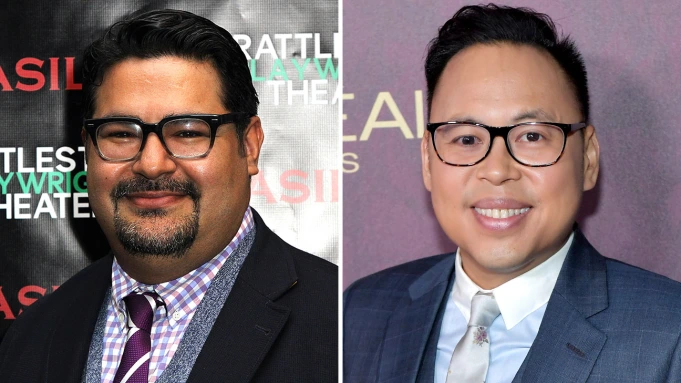‘Jane the Virgin,’ ‘Vida’ Writers Talk Onscreen Representation
Oct 3, 2018

Monica Schipper/Getty Images; Neilson Barnard/Getty Images for Entertainment Weekly
“Everybody will always say every story has been told,” said the first Latina to have starred in both a sitcom (ABC’s Cristela) and a Pixar film (Cars 3), Cristela Alonzo, during Define American‘s Tuesday night panel. “That’s not fucking true. Because I’m the only one to ever exist like me, and when I die, there will be no one like me.”
Best known for consulting with creatives to tell authentic onscreen stories about immigrants in America, the nonprofit invited a group of TV writers, producers and talent to the Writers Guild Theater for a conversation moderated by The Hollywood Reporter’s Rebecca Sun. Along with Jane the Virgin scribe Rafael Agustin, Vida writer/producer Mando Alvarado, Roswell, New Mexico executive producer Chris Hollier, and Superstore regular Nico Santos, Alonzo responded to the preliminary results of “Immigration Nation: Exploring Immigrant Portrayals on Television,” a study of 47 popular series that aired during the past year.
The Norman Lear Center for the Study of Media, Entertainment and Society conducted the research. Among its findings were that immigrants are over-represented in the media as men and criminals, while underrepresented as women and recipients of advanced degrees, compared to their real-life counterparts. Later this month, the center’s data will be published in a full report.
The discussion on Tuesday delved into how the panelists portray undocumented immigrants in their work, as well as network/executive feedback. Roswell, New Mexico is a remake of Roswell, which debuted on The WB in 1999. In the first iteration of the series, Shiri Appleby played Liz even though the character was Mexican in the source material (YA books by Melinda Metz). For the reboot, creator Carina Adly MacKenzie will fix that, explained Hollier, prompting Santos (Crazy Rich Asians) to joke, “So that’s ScarJo, is that who’s playing it?”
Agustin, who was born in Ecuador, shared his own experience of learning during his college application process that he was undocumented. “Being undocumented is how I ended up being a TV writer, because I come from a long line of lawyers and doctors in my family,” he said. “In fact my father’s a pediatric surgeon who came to this country to work at a car wash. And my mother was an anesthesiologist who came to this country to work at K-Mart.”
During his tenure in the Sundance Institute Episodic Story Lab, Agustin crafted his own autobiographical, hourlong show, later bought by Jane the Virgin’s network, The CW. The program was not picked up to series, but CBS Studios had him rework the concept into a 30-minute comedy, Rafa the Great. He and executive producer Gina Rodriguez pitched the revamp a few weeks ago and are awaiting a verdict. Meanwhile, at Jane the Virgin, he reports to a white showrunner, Jennie Snyder Urman. “I’ve spoken to a lot of other TV writers, and it’s sad to me, but fortunate for me, that I keep hearing the same thing: that it’s female showrunners that are more dedicated to embracing diversity than their male counterparts,” he said.
Alonzo has her own pilot-season battle scars: She turned down three consecutive shows that each had “a monologue where I talked to somebody and told them that I was undocumented.” Lamenting, “Why do I have to do that?” she continued, “It’s always that scene where it’s like, ‘I remember when I was 6, and I crossed the river on my mom’s shoulders’ … and then at the end I’m like, ‘Do you want coffee?’ “
Cristela was canceled in 2015 after 22 episodes. Terri Hoyos portrayed her mother, but the character’s undocumented status was not disclosed. “When you meet someone, you don’t ask about their legal status right off the top,” Alonzo explained. “And so I kind of figured that if I could make this character lovable to people, and then introduce her reality, I would trick people into changing their negative narrative that might exist.”
On Vida, Alvarado had a perfect retort for an executive who described two white roles he had penned as “cartoonish.” “‘For the first time, you’re seeing yourself through my lens. You don’t know how many times I walk down the street and I walk by a white person who locks the car. I enter an elevator and he moves to the side,” he said. “If we’re sitting here and you put your wallet onto the table, you’re gonna looking at me thinking I’m gonna steal it. And you don’t even know you’re doing it. You look cartoonish.’ “
Read the full article here.
